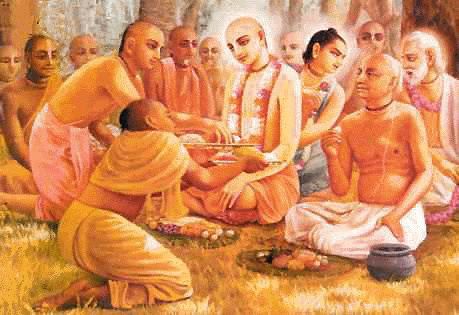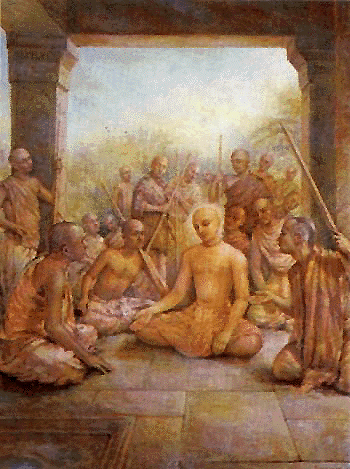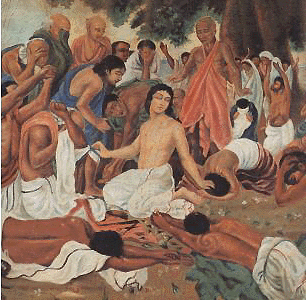
|
|
|
|
BY: SUN STAFF

Feb 19, CANADA (SUN) — A serial exploration of the holy sites visited by Lord Caitanya. Lord Caitanya Takes His Leave of the Devotees, Part 2
Before we resume our journey to the individual tirthas visited by Lord Chaitanya Mahaprabhu, we offer the remainder of the super-excellent narrative from Sri Caitanya-caritamrta Madhya Lila 7 which details the arrangements made by the Lord, and His pastimes immediately preceding His pilgrimage to the south of India. Following is the second of this three-part narrative:
Caitanya-caritamrta Madhya Lila 7.42-105 As soon as they entered his house, Sarvabhauma Bhattacarya offered the Lord obeisances and a place to sit. After seating all the others, the Bhattacarya took his seat. After they had discussed various topics about Lord Krsna, Sri Caitanya Mahaprabhu informed Sarvabhauma Bhattacarya, "I have come to your place just to receive your order. "My elder brother, Visvarupa, has taken sannyasa and gone to South India. Now I must go search for Him. "Please permit Me to go, for I must tour South India. With your permission, I shall soon return very happily." Upon hearing this, Sarvabhauma Bhattacarya became very agitated. Catching hold of the lotus feet of Caitanya Mahaprabhu, he gave this sorrowful reply. "After many births, due to some pious activity I got Your association. Now providence is breaking this invaluable association. "If a thunderbolt falls on my head or if my son dies, I can tolerate it. But I cannot endure the unhappiness of Your separation. "My dear Lord, You are the independent Supreme Personality of Godhead. Certainly You will depart. I know that. Still, I ask You to stay here a few days more so that I can see Your lotus feet." Upon hearing Sarvabhauma Bhattacarya's request, Caitanya Mahaprabhu relented. He stayed a few days longer and did not depart. The Bhattacarya eagerly invited Lord Caitanya Mahaprabhu to his home and fed Him very nicely. The Bhattacarya's wife, whose name was Sathimata (the mother of Sathi), did the cooking. The narrations of these pastimes are very wonderful. Later I shall tell about this in elaborate detail, but at present I wish to describe Sri Caitanya Mahaprabhu's South Indian tour. After staying five days at the home of Sarvabhauma Bhattacarya, Sri Caitanya Mahaprabhu personally asked his permission to depart for South India. After receiving the Bhattacarya's permission, Lord Caitanya Mahaprabhu went to see Lord Jagannatha in the temple. He took the Bhattacarya with Him. Seeing Lord Jagannatha, Sri Caitanya Mahaprabhu also begged His permission. The priest then immediately delivered prasada and a garland to Lord Caitanya. Thus receiving Lord Jagannatha's permission in the form of a garland, Sri Caitanya Mahaprabhu offered obeisances, and then in great jubilation He prepared to depart for South India. Accompanied by His personal associates and Sarvabhauma Bhattacarya, Sri Caitanya Mahaprabhu circumambulated the altar of Jagannatha. The Lord then departed on His South Indian tour. While the Lord was going along the path to Alalanatha, which was located on the seashore, Sarvabhauma Bhattacarya gave the following orders to Gopinatha Acarya. "Bring the four sets of loincloths and outer garments I keep at home, and also some prasada of Lord Jagannatha's. You may carry these things with the help of some brahmana." While Lord Sri Caitanya Mahaprabhu was departing, Sarvabhauma Bhattacarya submitted the following at His lotus feet, "My Lord, I have one final request that I hope You will kindly fulfill. "In the town of Vidyanagara, on the bank of the Godavari, there is a responsible government officer named Ramananda Raya. PURPORT "Please do not neglect him, thinking he belongs to a sudra family engaged in material activities. It is my request that You meet him without fail." PURPORT A visayi is one who is attached to family life and is interested only in wife, children and worldly sense gratification. The senses can be engaged either in worldly enjoyment or in the service of the Lord. Those who are not engaged in the service of the Lord and are interested only in material sense gratification are called visayi. Srila Ramananda Raya was engaged in government service, and he belonged to the karana class. He was certainly not a sannyasi in saffron cloth, yet he was in the transcendental position of a paramahamsa householder. Before becoming Caitanya Mahaprabhu's disciple, Sarvabhauma Bhattacarya considered Ramananda Raya an ordinary visayi because he was a householder engaged in government service. However, when the Bhattacarya was actually enlightened in Vaisnava philosophy, he could understand the exalted transcendental position of Sri Ramananda Raya; therefore he referred to him as adhikari. An adhikari is one who knows the transcendental science of Krsna and is engaged in His service; therefore all grhastha devotees are designated as dasa adhikari. Sarvabhauma Bhattacarya continued, "Ramananda Raya is a fit person to associate with You; no other devotee can compare with him in knowledge of the transcendental mellows. "He is a most learned scholar as well as an expert in devotional mellows. Actually he is most exalted, and if You talk with him, You will see how glorious he is. "I could not realize when I first spoke with Ramananda Raya that his topics and endeavors were all transcendentally uncommon. I made fun of him simply because he was a Vaisnava." PURPORT tesam satata-yuktanam "To those who are constantly devoted to serving Me with love, I give the understanding by which they can come to Me." (Bg. 10.10) The Vedas are considered to have been spoken by the Supreme Lord. They were first realized by Brahma, who is the first created being within the universe (tene brahma hrda ya adi-kavaye). Our process is to receive knowledge through the parampara system, from Krsna to Brahma, to Narada, Vyasa, Sri Caitanya Mahaprabhu and the six Gosvamis. By disciplic succession, Lord Brahma was enlightened from within by the original person, Krsna. Our knowledge is fully perfect due to being handed from master to disciple. A Vaisnava is always engaged in the transcendental loving service of the Lord, and thus neither karmis nor jnanis can understand the activities of a Vaisnava. It is said, vaisnavera kriya-mudra vijneha na bujhaya: even the most learned man depending on direct perception of knowledge cannot understand the activities of a Vaisnava. After being initiated into Vaisnavism by Sri Caitanya Mahaprabhu, Bhattacarya realized what a mistake he had made in trying to understand Ramananda Raya, who was very learned and whose endeavors were all directed to rendering transcendental loving service to the Lord. The Bhattacarya said, "By Your mercy I can now understand the truth about Ramananda Raya. In talking with him, You also will acknowledge his greatness." Lord Sri Caitanya Mahaprabhu accepted Sarvabhauma Bhattacarya's request that He meet Ramananda Raya. Bidding Sarvabhauma farewell, the Lord embraced him. Sri Caitanya Mahaprabhu asked the Bhattacarya to bless Him while he engaged in the devotional service of Lord Krsna at home, so that by Sarvabhauma's mercy the Lord could return to Jagannatha Puri. PURPORT Saying this, Sri Caitanya Mahaprabhu departed on His tour, and Sarvabhauma Bhattacarya immediately fainted and fell to the ground. Although Sarvabhauma Bhattacarya fainted, Sri Caitanya Mahaprabhu did not take notice of him. Rather, He left quickly. Who can understand the mind and intention of Sri Caitanya Mahaprabhu? PURPORT This is the nature of the mind of an uncommon personality. Sometimes it is soft like a flower, but sometimes it is as hard as a thunderbolt. PURPORT "The hearts of those above common behavior are sometimes harder than a thunderbolt and sometimes softer than a flower. How can one accommodate such contradictions in great personalities?" Lord Nityananda Prabhu raised Sarvabhauma Bhattacarya and with the help of His men saw him to his home.

Immediately all the devotees came and partook of Sri Caitanya Mahaprabhu's company. Afterwards, Gopinatha Acarya came with the garments and prasada. All the devotees followed Sri Caitanya Mahaprabhu to a place known as Alalanatha. There they all offered respects and various prayers. In great ecstasy, Sri Caitanya Mahaprabhu danced and chanted for some time. Indeed, all the neighbors came to see Him. All around Sri Caitanya Mahaprabhu, who is also known as Gaurahari, people began to shout the holy name of Hari. Lord Caitanya, immersed in His usual ecstasy of love, danced in the midst of them. The body of Sri Caitanya Mahaprabhu was naturally very beautiful. It was like molten gold dressed in saffron cloth. Indeed, He was most beautiful for being ornamented with the ecstatic symptoms, which caused His hair to stand on end, tears to well in His eyes, and His body to tremble and perspire all over. Everyone present was astonished to see Sri Caitanya Mahaprabhu's dancing and His bodily transformations. Whoever came did not want to return home. Everyone--including children, old men and women--began to dance and chant the holy names of Sri Krsna and Gopala. In this way they all floated in the ocean of love of Godhead. Upon seeing the chanting and dancing of Lord Sri Caitanya Mahaprabhu, Lord Nityananda predicted that later there would be dancing and chanting in every village. PURPORT Seeing that it was already getting late, Lord Nityananda Prabhu, the spiritual master, invented a means to disperse the crowd. When Lord Nityananda Prabhu took Sri Caitanya Mahaprabhu for lunch at noon, everyone came running around Them. After finishing Their baths, They returned at noon to the temple. Admitting His own men, Sri Nityananda Prabhu closed the outside door. Gopinatha Acarya then brought prasada for the two Lords to eat, and after They had eaten, the remnants of the food were distributed to all the devotees. Hearing about this, everyone there came to the outside door and began chanting the holy name, "Hari! Hari!" Thus there was a tumultuous sound. After lunch, Sri Caitanya Mahaprabhu made them open the door. In this way everyone received His audience with great pleasure. The people came and went until evening, and all of them became Vaisnava devotees and began to chant and dance. Sri Caitanya Mahaprabhu then passed the night there and discussed the pastimes of Lord Krsna with His devotees with great pleasure. The next morning, after taking His bath, Sri Caitanya Mahaprabhu started on His South Indian tour. He bade farewell to the devotees by embracing them.

Although they all fell to the ground unconscious, the Lord did not turn to see them but proceeded onward. In separation, the Lord became very perturbed and walked on unhappily. His servant, Krsnadasa, who was carrying His waterpot, followed behind. All the devotees remained there and fasted, but the next day they all unhappily returned to Jagannatha Puri. Almost like a mad lion, Lord Sri Caitanya Mahaprabhu went on His tour filled with ecstatic love and performing sankirtana, chanting Krsna's names as follows. The Lord chanted:
That is, "O Lord Krsna, please protect Me and maintain Me." He also chanted:
That is, "O Lord Rama, descendant of King Raghu, please protect Me. O Krsna, O Kesava, killer of the Kesi demon, please maintain Me." Chanting this verse, Lord Sri Caitanya Mahaprabhu, known as Gaurahari, went on His way. As soon as He saw someone, He would request him to chant "Hari! Hari!" Whoever heard Lord Caitanya Mahaprabhu chant "Hari, Hari," also chanted the holy name of Lord Hari and Krsna. In this way they all followed the Lord, very eager to see Him. After some time the Lord would embrace these people and bid them to return home, having investing them with spiritual potency. PURPORT Being thus empowered, they would return to their own villages, always chanting the holy name of Krsna and sometimes laughing, crying and dancing. These empowered people used to request everyone and anyone--whomever they saw--to chant the holy name of Krsna. In this way all the villagers would also become devotees of the Supreme Personality of Godhead. PURPORT Simply by seeing such empowered individuals, people from different villages would become like them by the mercy of their glance. When these individuals returned to their villages, they also converted others into devotees. When others came to see them, they also were converted. In this way, as those men went from one village to another, all the people of South India became devotees. Thus many hundreds of people became Vaisnavas when they passed the Lord on the way and were embraced by Him.
| |